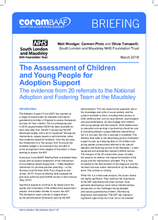

Displaying 1091 - 1100 of 1648
According to this article, the Latvian government is seeking to raise the minimum age at which children living in institutions in the country can be sent abroad to stay with a "host family" in the US.
This paper provides an overview of neglect as a phenomenon and explores some of these challenges for and to practice.
A present study is aimed at evaluating changes of foster care adolescents' self-efficacy and psychological functioning during the solution-focused self-efficacy enhancement group intervention for adolescents.
The present study is aimed at evaluating changes of foster care adolescents' self-efficacy and psychological functioning during the solution-focused self-efficacy enhancement group intervention for adolescents.
In this paper, the authors outline key findings about the educational attainment of children and young people in care as identified by national and international research on this topic.
This Briefing Note adds to the developing picture of adoption support issues by analysing data on 20 children and young people consecutively referred to the special adoption and fostering service at the Maudsley – a wellrespected and established national CAMHS service.
Through the case of a young Sri Lankan woman who arrived in Denmark as an ‘unaccompanied asylum-seeking minor’ and spent five years within the Danish asylum system, this article explores how she experienced moving through different legal categories and the institutional settings associated with them.
This paper presents findings from two studies, in England (2012) and Ireland (2013), which explored experiences of unaccompanied refugee minors (URM) in foster care.
This article from the Guardian describes the lack of support that many kinship carers in the UK experience.
This paper examines the longer term outcomes of young people who experienced out of home care (OHC) as children, in Britain, Germany and Finland, countries characterised by different welfare regimes.

